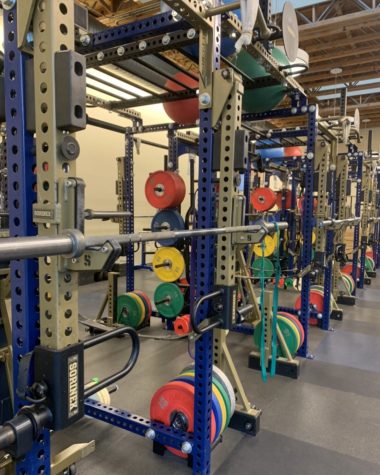Weighing in the Balance
The Fine Line Between Gym Dedication and Disordered Eating
Weightlifting can help people accomplish some incredible feats, like effortlessly clearing a 12 foot bar in pole vault. With the right attitude, the gym is a great place to build self esteem and strength.
Gym bros; we all know them, we all love them. Perhaps we even are them. You know the type: they prowl that rubber-tiled floor with unmatched bravado, are encyclopedias of workout routines, and share their progress on Instagram with Kanye lyrics playing proudly in the background.
Of course, there’s variation from gym bro to gym bro, but one thing remains unequivocally constant; these guys and girls are seriously dedicated to their fitness. Consistency is key when it comes to making gains, so extended breaks are generally discouraged. Moreover, maintaining a specific diet is paramount to seeing those desired physical results. This often encourages careful monitoring of food intake to ensure that athletic goals are met in a timely manner.
One popular technique among many is known as bulking and cutting, which refers to eating in a repetitive cycle of calorie surplus and calorie deficit. This can strategically build muscle while simultaneously reducing fat, which is appealing to many devoted gym-goers.
Because many of these people aim to see sizable differences in their physique in a short amount of time, strict eating regimens like bulking and cutting are very common. Instagram accounts like @ketomealrecipe, @ownyoureating and @ironwolf.fitness all promote specific diet and meal plans, which many of their followers subscribe to.
And while health-conscious eating is widely promoted by the medical community, there is also an intentional emphasis from professionals on balance and moderation. According to Healthline, “it’s best to steer clear of diets that require you to severely restrict your calories. Instead, opt for diets that are focused on diet quality and encourage you to make sustainable lifestyle changes.”
Most susceptible to “bigorexia”—body dysmorphia with hyperfixation on muscle mass—are young men and boys with concern for their body image. After all, it’s easy to mask disquieting symptoms of mental illness behind the pursuit of good health and a highly coveted physique. According to NEDA, one in three people with a diagnosed eating disorder are male; but cultural stigma makes men significantly less likely for men to seek treatment.
Zoe Parker ‘23, president of the Bring Change to Mind Club on campus, expressed her concern about the matter.
“As a culture, we support boys overeating and undereating to reach certain goals. There are sports that pertain specifically to weight, like wrestling, where you cannot participate if you’re not a certain weight, which drives people to go really hard on themselves…On the other hand, we make it normal to count calories. Personally, I’m very adamant on only working out because I want to work out… I’m doing it because I want to feel good,” said Parker.
In summer 2022, Planet Fitness offered free gym memberships to teenagers at all 1,899 of their locations. And the program was wildly successful—according to their website, more than 3.5 million teenagers participated worldwide, a number that includes many students from Notre Dame.

Access to fitness facilities can encourage young people to take control of their health at an earlier age, which is undeniably a good thing. But it also means that the demographic of people who could develop gym-related body dysmorphia or disordered eating habits will increase. And in years characterized by bodily changes, raging hormones, and difficulties with fitting in, high schoolers are already vulnerable to negative self-talk—another environment for comparison with unrealistic expectations of physical perfection is far from ideal.
Molly Pearlman ‘11, is an all-American athlete who has weightlifted for over a decade. As a young gymnast, then a pole vaulter in high school, and now as a track coach at Notre Dame, the gym has been an integral part of her life.
“Weightlifting has made me feel much stronger for sport, more confident in my athletic abilities, and also more confident for life in general…For myself, I focus on the mental impact of exercise. It’s really good for your brain to move your body. Approaching it that way has been healthier for me, instead of focusing on exercise as ‘work’— which is how I was raised to view it. So I try to participate in exercise that makes me feel good physically and emotionally. And if it’s no longer doing that, I stop.”
Questioning why you are performing a certain athletic activity can certainly reveal negative biases in your motivations. Exercising with the primary goal of changing your body, or treating exercise as an undesirable labor can have big impacts on your self-image.
So what can we do about it?
The first step in recovering from a gym-related disordered eating is to recognize—and then acknowledge—the behavioral and emotional symptoms it is associated with.
It is a common belief that all EDs present themselves in obvious physical changes, like extreme weight loss or fatigue. This, however, is a dangerous and untrue misconception that leads many to overlook the severity of many harmful mental side effects. Disordered eating, of course, is a mental illness.
According to Self.com, experts agree on some important signs that continual exercise may be crossing a line into something darker:
- Working out through injury or illness
- Feeling tremendous guilt or depression if a workout is skipped
- Using exercise to balance out or compensate for food
- Skipping activities that one enjoys because they’re not deemed a good enough workout
- Conversely, doing activities one dislikes because they are considered a good workout
- Defining one’s self-worth based on exercise and fitness ability
- Using exercise as a primary way to cope with negative emotions
- Acting defensively if someone brings up this excessive exercise as a potential problem
If you notice the development of patterns like these in yourself or a friend, don’t feel ashamed to reach out for help. Talking to a trusted adult, like a parent or school counselor, is the most ideal situation—but understandably, it’s not always a possibility. If you’re more comfortable speaking to someone anonymously, consider contacting the National Eating Disorders Association (NEDA) helpline, accessible through call or text on their website.
And as always: you are not alone. There are resources available to you; recovery is possible.





